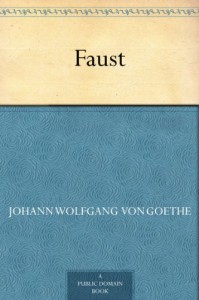
Faust by Johann Wolfgang von Goethe (trans. Bayard Taylor)

Bayard Taylor’s translation of FAUST is one of the very few recommendable public domain translations of any classic, period.
As a very successful poet back in his day, Taylor used his expertise to stay true to Goethe’s original without feeling overwrought or stilted in turn. According to the introduction, Taylor wanted to fill a void that other FAUST translators of his time overlooked: to stay true to both the underlying intentions and poetic meter of the entire work. He clearly put a lot of effort and research into overcoming the numerous problems that come with such a translation, and the introduction even quotes Goethe’s own opinions on translating to support Taylor’s own technical decisions. The quality still shines through over a hundred years later.
If there are any major flaws with the Taylor translation, it’s that the English language has evolved since the late nineteenth century. The English text is archaic at its core, and your mileage may vary as to how well it works. Frequently huge chunks of book were easy to follow, only be to thrown off entirely by one confusing word or sentence. This Kindle edition does not contain any footnotes aside from the introduction from the translator, so it might be confusing to readers who aren’t familiar with the author or source material. The Kindle dictionary does provide definitions for most of the obscure word choices that Taylor made, however.
The play itself is an adequate read. FAUST follows the story of a doctor who sells his soul to the devil to fulfill all his desires. Mephistopheles, the demon, plays the role of a servant while secretly masterminding the doctor’s downfall. Goethe’s version of the folktale draws most of its attention not to the inner-conflict of Doctor Faust, but instead it focuses on the effects his immoral actions have on society. Faust himself isn’t so much interested in knowledge like in the traditional version of the story, but simply needs a distraction from his own problems. Disappointingly, this kindle edition does not include Part II, so the story ends on a nasty cliffhanger.
FAUST is more interesting to discuss thematically than it is to read. As there are no stage directions, most of the action is described passively by the characters present. The constant philosophizing doesn’t help make the play any more engaging, especially when none of the characters are particularly likable. Goethe’s brand of melodrama and humor is well-written, of course, but finishing the book became a chore after a while. The plot is easily the weakest link—after all the time build up to the deal being made, the Faust and Mephistopheles seem content to hit on girls, attend random witch gatherings, and play pranks on strangers. It’s not exactly the most profound quest for knowledge in the universe.
If you’re the type of person who loves reading Shakespeare, you’ll probably like Taylor’s translation of FAUST. Otherwise, I’d recommend moving on to a much easier classic instead.
 7
7

















